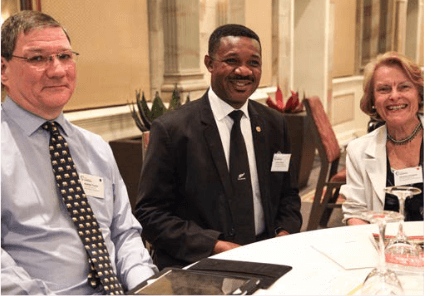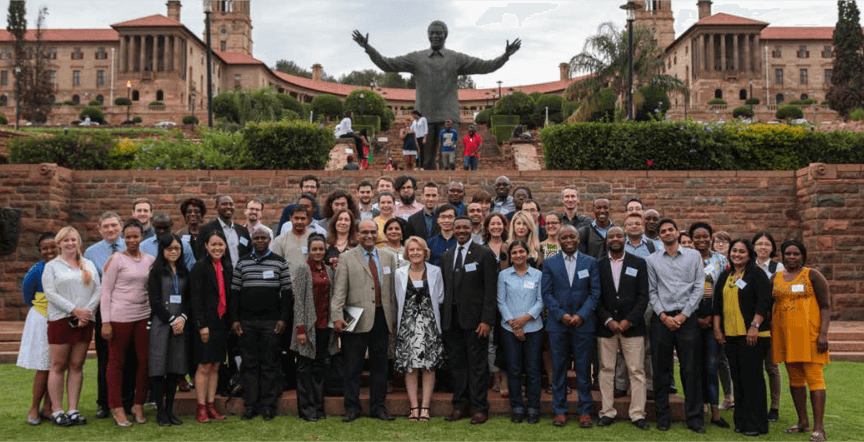Symposium overview
The Frontiers event took place in Addis Ababa, Ethiopia between 12 to 14 October 2022. The event saw 67 delegates from different disciplines, fields, and countries come together to discuss how to create economies that embrace innovation while fostering greater inclusivity. The event was co-chaired by Dr Mike Short FREng and Dr Joyce Mwangama.
The promise of modern technology to improve lives is great – from optimised supply chains to community-tailored infrastructure, remote healthcare, and more. However, there are already indications of a growing technological gap. For instance, though 95% of the world lives in range of a mobile broadband network, only 60% use it – and 96% of those still offline live in low- and middle-income states. This digital divide leaves the world’s most vulnerable and marginalised excluded from the socio-economic benefits of new technology.

“I go to many great conferences but at Frontiers of Engineering for Development your mind is continuously being expanded with every conversation."
Dr Prasad Ram, Symposia Chair
Chairs

Dr Mike Short FREng, Chief Scientific Adviser, UK Department for International Trade (DIT)
After 30 years with Telefonica, Dr Mike Short FREng joined the UK DIT as its Chief Scientific Adviser in 2017. He ensures that DIT policy is informed by the best science, engineering, and technical advice. He provides guidance on the technical aspects of international trade deals, supports inward investment and engineering collaboration, and works with the UK’s research, innovation, and academic communities to boost scientific and engineering exports. Mike is interested in the promotion of international technical standards in mobile and digital technology.

Dr Joyce Mwangama, University of Cape Town
Dr Joyce Mwangama has been a lecturer at the University of Cape Town in the Department of Engineering since 2015. She lectures on a variety of courses including network engineering, mobile broadband, and wireless networks. Her research interests include 5G and 6G network architectures and services, digital health, and telemedicine. Joyce advises the Independent Communications Authority of South Africa 5G Forum on the research and development of 5G and 6G.
Sessions and speakers
Inclusive economic infrastructure
and financial services
This session delved into the complexities of financial inclusion and examples of effective financial services for marginalised populations.
Together, participants brainstormed different ways to address financial exclusion in rural contexts.

You are all agricultural engineers; you just don't know it!
Alastair Taylor
Presentations
Scale of the jobs challenge, and better livelihoods for women
harnessing new technology
Catherine Wanjoya, Silmak Genesis Care
In his presentation, Catherine Wanjoya spoke about ...
Size of the innovation, technology, and job opportunity around gig economy
Wossen Ayele, Pariti
In his presentation, Wossen Ayele spoke about...
Broad issues with meeting this opportunity: adaptation and
capacity building in AI for improved productivity
Dr Lebsework Negash, Addis Ababa University
In his presentation, Lebsework Negash explored ...
Technology-driven jobs and capacity building
In this session, Session chairs kicked off the discussion on technology-driven jobs and capacity building
by querying how effective these have been in addressing the youth unemployment gap in Africa. Participants provided several examples, including the ‘Hustlers Plan’ in Kenya, which helps young people start businesses, and job search assistance in India that could be applied in an African context. They also highlighted private sector led solutions such as innovation competitions for youth to participate in and incubator programmes.

Participants xxxxxx at
Session summary:
During the round-table discussion, speakers and participants concluded that equal access to education results must be fostered – not just to resources. In addition, digital learning experiences must be complemented with offline activities. The reason being, that classroom instructional practices such as personalisation through real-time data can strongly contribute to learning outcomes. It is also important to go beyond the curriculum and develop non-cognitive skills, as this will help to secure stronger outcomes for students.Lastly, speakers and participants agreed that in terms of examinations, relying on multiple choice questions does not provide ‘quality of evidence’ that allows students to understand why answers are correct or incorrect.
The way forward: technology for an inclusive and sustainable society
Underlining the connection between food, health, and wealth, the session chairs utilised a triangle model to show how the different elements contributes to the others. The session chairs delved into how each of the three elements can inform and benefit from technology now and in the future to build inclusive economies.
Presentations
Feeding the big data demon to feed the world
Nishanth Sastry, King’s College London
Collecting and using data is an integral part of solving the world’s challenges, but it’s not that simple, according to Nishanth Sastry. In his presentation, Nishanth drew on his experience working on BBC’s iPlayer data to outline his vision agricultural transformation in LMICs using techniques like large image-based datasets, A/B testing, and randomised controlled trials.
Geographic data: Making the information available and usable
Serena Coetzee, Centre for Geoinformation Science, University of Pretoria
In her presentation, Serena Coetzee explained that the availability and usability of geographic information is essential for the wellbeing of society. In particular, ‘geovisualisations’ – also known as maps – can reveal patterns across regions. These spatial patterns, in turn, can help monitor and track geographical phenomena such as weather, soil quality, climate change, pests, and more. This can be seen in the maps used in the 1850s to track cholera cases across London. In a modern view, Serena described how cloud-based geovisualisation tools have the potential to make data more accessible.


The use of remote sensing, data analytics and spatial information systems to help reduce
environmental and economic loss in the aquaculture industry
Lee Annamalai, Meraka Institute
Aquaculture in South Africa – both wild and farmed – suffer losses due to the overgrowth of algae. But there’s a solution to this, according to Lee Annamalai. In his presentation, Lee introduced a new monitoring and altering system that was developed by the Council of Scientific and Industrial Research (CSIR). A system like this can help geo-locate these areas of overgrowth and predict their movements based on ocean models. The system also feeds into an interactive dashboard that is sent out to relevant stakeholders to help prevent or address algae overgrowth.
Big data challenges: Lessons from the Millennium Development Goals (MDGs)
Selma Karuaihe, University of Pretoria
Achieving the MDGs requires big data, but this is as simple as it sounds. In her presentation, Selma Karuaihe drew on her expertise as a consultant and country author for MDG7: Ensuring Environmental Sustainability. She noted that one of the biggest challenges to monitoring progress on the MDGs was gaining access to reliable big data that met international standards. Selma outlined three main challenges: first, using big data to locate data for all the sub-targets of MDG 7; second, using big data to curate a solution that fits international standards; and third, using big data to mediate between the problem and available solution in a way that makes it useful to local, national, and multinational stakeholders.
Interested in the next Frontiers symposium?
Find out more about Frontiers, including eligibility below and @RAEngGlobal
